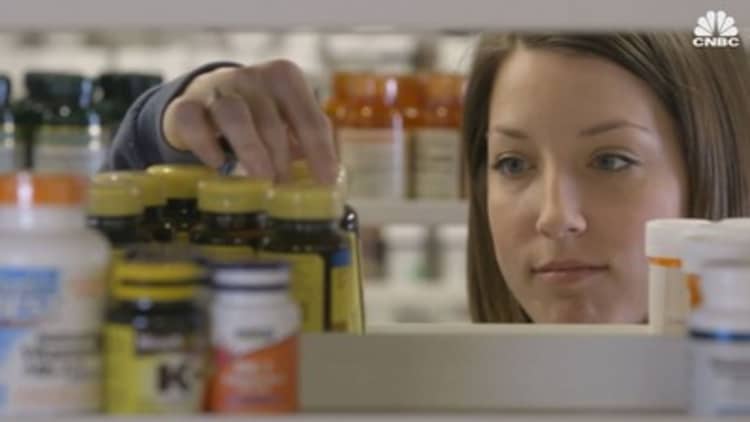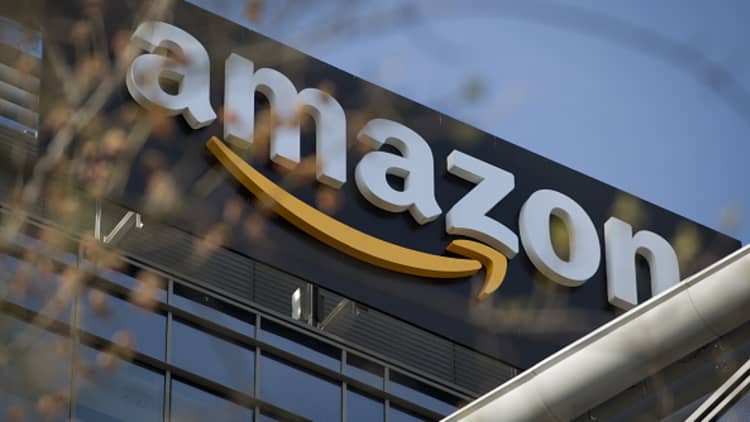
Amazon is acquiring online pharmacy PillPack in a deal that is already shaking up the drugstore industry.
The move is the strongest indication yet of Amazon's intent to push further into the health-care industry. It threatens to remove one of the few distinguishing factors pharmacy chains have relied on to fend off Amazon, the sale of prescription drugs. Retailers like Walgreens Boots Alliance, CVS Health and Rite Aid have seen their so-called front of store sales threatened as shoppers increasingly buy household staples online or from convenience stores.
Shares of all three tanked Thursday on the news, along with drug distributors Cardinal Health, AmerisourceBergen and McKesson. Rite Aid, Walgreens and CVS Health lost about $12.8 billion in market value on Thursday alone.
PillPack, which organizes and delivers packages of medications for consumers, is licensed to ship prescriptions in 49 states, according to its website.
"Yes, it's a declaration of intent from Amazon," Walgreens Boots Alliance CEO Stefano Pessina acknowledged to analysts in a planned call to discuss its quarterly earnings, according to an initial transcript from FactSet. "[But] the pharmacy world is much more complex than the delivery of a certain [pills or] packages."
Terms of the deal with Amazon were not disclosed, though people familiar with the matter told CNBC that Amazon paid roughly $1 billion. The companies expect it to close during the second half of the year.
The start-up has raised $118 million in funding from investors including CRV and Menlo Ventures, and it reached more than $100 million in revenue in 2017, the company has said. In 2016 it was reported to be valued at $330 million.
The company previously had sale talks with Walmart, which had considered buying the start-up for less than $1 billion, CNBC has reported.

“PillPack’s visionary team has a combination of deep pharmacy experience and a focus on technology,” Jeff Wilke, Amazon CEO Worldwide Consumer, said in a statement. “PillPack is meaningfully improving its customers’ lives, and we want to help them continue making it easy for people to save time, simplify their lives, and feel healthier. We’re excited to see what we can do together on behalf of customers over time.”
Amazon already sells private label over-the-counter drugs through a partnership with Perrigo and has obtained pharmacy licenses in a few states. It also has licenses to distribute medical devices in nearly every state.
"The pharmacy industry has entered its next phase of evolution," said Adam Fein, CEO of Pembroke Consulting's Drug Channels Institute. "Retail pharmacies will find their high-profit cash business under pressure. Expect a pharmacy shakeout over the next five years."
Most drugstores and pharmacy benefits managers, firms that administer prescription drug plans, already offer mail services.
CVS last week announced it would offer one- and two-day delivery to all of its retail pharmacy customers nationwide and extend same-day delivery to more cities. A spokeswoman told CNBC the company thinks it's well-positioned and ahead in the area where PillPack plays, saying CVS offers similar services.
"Keep in mind, that we have not seen a large shift of patients that are looking for their medications to be delivered versus coming to a retail pharmacy," she said.
For Amazon to move into prescription drug delivery, though, it will need to change the shopping habits of a set of shoppers that tend to stick to a routine when it comes to how and where they buy their prescription drugs. It may also find a more limited buyer-set, as people with pressing needs like medicine for a sinus infection may have little patience to wait for online delivery.
PillPack generally caters to people with multiple chronic conditions who can benefit from its drug sorting capabilities.
"I think it’s an overhang more than anything else," said Jefferies analyst Brian Tanquilut. "It’s hard to figure out what it really does or when it impacts the pharmacies, but it weakens sentiment on the group further. PillPack is already in the market, so it shouldn’t have much of an incremental impact until Amazon figures out how to grow its share and expand it by integrating it into the app."
Nonetheless, drugstores continue to build up their Amazon defenses.
CVS is in the process of acquiring health insurer Aetna for $69 billion in a deal that would combine its retail pharmacies, walk-in clinics and pharmacy benefits manager Caremark with Aetna's insurance plans.
Rite Aid, meanwhile, is trying to merge with grocery chain Albertsons. Walgreens is partnering with a number of health-care businesses, including health insurers Humana and UnitedHealth Group and lab testing provider LabCorp, to add more health services to its stores.
Amazon CEO Jeff Bezos partnered with J.P. Morgan CEO Jamie Dimon and Berkshire Hathaway CEO Warren Buffett earlier this year to create a nonprofit company aimed at lowering health-care costs for their roughly 1.2 million employees. They revealed last week that acclaimed surgeon and author Dr. Atul Gawande will lead the initiative.
The venture will be based in Boston, near PillPack's headquarters.
-CNBC's Christina Farr contributed to this report



